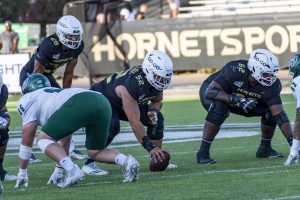French official speaks about U.S. relations
February 14, 2006
Despite echoes of recent discord between France and the United States, the two countries have a solid friendship based on common values, said Pierre Mattot, press officer for the French Consulate in San Francisco, on Feb. 7 at Sacramento State.
Because the United States is the indispensable power and France is an indispensable ally, there is a need to work together in this new (post Sept. 11) world, Mattot said, who has been at his post for 18 months.
In front of a near-capacity crowd in the Musical Recital Hall in Capistrano Hall, Mattot said, (U.S. President Bush and French President Jacques Chirac) are good friends again.
Mattot cited the fight against terrorism as the point of interest shared by the two nations, even though France didn’t view invading Iraq as part of that struggle.
France opposed the Iraq war because she believed that there was no immediate threat to Europe or the United States, no links from Saddam (Hussein) to terrorists and no proof of weapons of mass destruction, Mattot said.
However, after a 2005 meeting in Brussels, Belgium, Bush and Chirac agreed to let history be the judge of these issues, said Mattot, who was making his first visit to Sac State.
Mattot mentioned joint actions taken by the two countries as evidence of their friendship: France sending 5,500 troops to Afghanistan to help depose the Taliban; daily exchanges between French and American intelligence agencies; and regular visits to the United States by France’s top terrorism judge, Jean-Louis Bruguiere.
Both France and the United States also oppose Iran’s nuclear ambitions because Iran is breaking its commitment to the Nuclear Nonproliferation Treaty, Mattot said.
Paul Scott, a junior psychology major, said Mattot’s speech reminded him of the historical connections between the two countries.
It was really interesting to hear the French point of view, Scott said. France is an old ally, something I’d forgotten because of recent events.
Student Reenesh Chand appreciated Mattot’s references to history, too, especially those concerning France’s part in the American Revolution and the United States’ intervention in World War II.
However, Chand, a junior criminal justice major, said he find Mattot especially informative otherwise.
I thought he was defensive; he didn’t want to make France look bad, Chand said. “But any other politician would protect his interests too.” Sociology professor Tom Kando, a self-described Francophile, had invited Mattot to the lecture.
Since Sept. 11, it has been popular to France-bash, and it aggravates me, Kando said, specifically referring to comedian Dennis Miller for making jokes that perpetuate stereotyping.
Hopefully, the lecture given by Mattot dispels some misunderstandings that Americans have about the French, Kando said.
Aside from world security concerns, Mattot mentioned trade and cultural interaction as important threads that bind the two nations.
France has $150 billion invested in the United States and the United States has three times as much invested in France, which forms the core of their economic tie, Mattot said. Additionally, French companies provide 70,000 jobs to Californians.
Mattot said 60 percent of English words originated in France and 1.7 million students at various U.S. educational levels study French, including his own children, who receive a bilingual education (French and English) in the Bay Area.
Mattot, who lives in Mill Valley with his wife and four kids, sees foreign language education as a key component in relations between France and the United States, and among the nations of the world. He said learning a second language exposes people to foreign cultures, which is crucial to preventing conflicts.
Mattot has a broad background in foreign affairs. He has served in French cultural offices in more than nine countries-including Iran, Iraq, Turkey and Pakistan. Mattot was stationed in Iran and Iraq during the Iran-Iraq conflict in the 1980s and helped reopen the French Embassy’s cultural department in Iran in 1988 ?” two years after it closed because of tensions.
Norm Erickson can be reached at [email protected]
























































































































